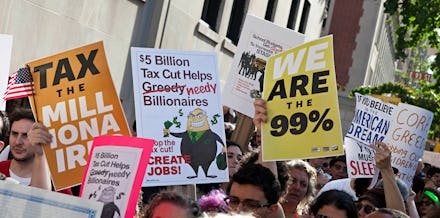Top-Paid CEOs Run Companies With Lousy Stock Performance, Study Finds

Exorbitant pay for chief executive officers is linked with poor company performance, according to new research from indexing and market research firm MSCI.
The study looked at the last decade of stock performance for 429 large and midsize companies and then compared those figures to the executive pay of about 800 CEOs. The results? In the decade from 2006 to 2015, investors were better off betting on companies with lower-paid CEOs.
For example, if you had invested $100 in the top 20% of companies by CEO pay, your holdings would have been worth about $265 a decade later. But if you had instead invested that same $100 into the lowest quintile of companies by CEO pay, you'd have made roughly $100 more.
This revelation comes at a time when executive pay is already receiving more scrutiny, and with good reason: CEO pay is 10 times larger than it was 30 years ago, according to the Economic Policy Institute.
The disparity between what company chiefs and workers are paid has gotten so dramatic that both presidential nominees have criticized CEO compensation; Republican nominee Donald Trump called the trend "disgraceful" in September.
And several CEOs are getting huge checks despite questionable performance. Roger Ailes is reportedly getting more than $40 million to leave Fox News following allegations of sexual harassment. And Marissa Mayer could make $55 million if she leaves Yahoo, which was recently bought by Verizon, despite her failure to turn the company around.
The MSCI findings matter because, as Marketplace explains, many companies and their boards have moved toward business models that more closely tie executive pay to how much value gets generated for shareholders.
In other words, CEOs are increasingly evaluated based on how much they make a company's stock go up — but those getting paid richly don't seem to be adding proportionately greater value.
And excessively high CEO pay isn't just correlated with lower stock performance: As critics of the growing disparity between worker and chief officer salaries have pointed out, this trend can also cause negative ripple effects throughout the company, leading to low confidence among staff and high turnover.
Read more: